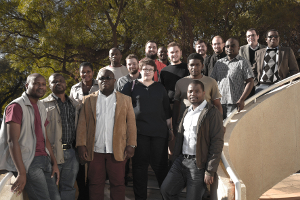Latest News Archive
Please select Category, Year, and then Month to display items
12 January 2024
|
Story Nonsindiswe Qwabe
|
Photo Sonia Small
 Since joining the UFS in 2008, Dr Grey Magaiza has worked extensively on approaches that can foster the socio-economic transformation of societies.
Since joining the UFS in 2008, Dr Grey Magaiza has worked extensively on approaches that can foster the socio-economic transformation of societies.
“The future should be one where communities can decide on their development agenda and futures. That’s the most important for me.” Dr Grey Magaiza, Deputy Director of the Centre for Gender and Africa Studies (CGAS) and Head of the Community Development programme on the Qwaqwa Campus, is passionate about capacitating communities to be agents of change and advancement. His vision for the future emphasises the empowerment of communities to take charge of their development by actively participating in decision making and the implementation of development projects that can improve their lives.
Since joining the UFS in 2008, Dr Magaiza has worked extensively on approaches that can foster the socio-economic transformation of societies. Over the years, he has crafted his research speciality into one that he is most proud of – being an interdisciplinary scientist immersed in the development of communities.
“I’m in a fortunate position of researching what I like. I say ‘fortunate’, because I’ve taken the time to understand what I’m passionate about, which is the overall field of rural livelihoods and livelihood futures – in short, community development. My research starts from an engaged university, understanding the elements that a university must use to enhance transformation and relevance to its immediate community in terms of development.”
One of the ways he has done this is by looking at social entrepreneurship as a development approach for young people in a rural setting. Through workshops with non-profit and civic organisations in Qwaqwa, Dr Magaiza has been helping these organisations to map out their needs and actively meet them through the involvement and support of external role players.
“We understand that communities are part of the national development agenda, but even that national agenda respects community knowledge and intentions and allows communities to shape their identity. A critical enabler of this is community organising. You bring back the capacity in communities to have dialogues on issues affecting them as spaces for engagement, knowledge exchange, and for people to just talk about their way forward.”
By enabling communities to define their development agenda, they can address their specific needs, challenges, and aspirations, he said. “When I look at livelihood futures, it’s quite an exciting aspect of my work – it’s like looking into a fortune tellers’ globe, because you’re not deciding for communities what they should do, but the communities themselves take those decisions.”
UFS International Studies Group makes history come alive globally
2015-07-15

The UFS International Studies Group comprises students who are top achievers drawn from South Africa, Southern and Central Africa and even further afield.
Photo: Charl Devenish |
Headed by Prof Ian Phimister, the UFS International Studies Group comprises six master’s, twelve PhD and twelve postdoctoral fellows who concentrate their research endeavours on African, Imperial and Global History. All of these students are top achievers drawn from South Africa, Southern and Central Africa and even further afield. This group, now only in its third year, presents a phenomenal research output with an international reach.
In the course of the past year alone, five PhD students secured fully-funded invitations to conferences and research seminars in South Africa, Britain, as well as the Netherlands. Our researchers have been publishing articles globally and securing visiting fellowships and research awards.
Dr Clement Masakure and Dr Rosa Williams won funding to present papers at the International Network for the History of Hospitals. Tinashe Nyamunda won a prestigious three-month Cadbury Fellowship at the University of Birmingham in the United Kingdom. Anusa Daimon has been selected as a 2015 Harry Guggenheim award winner, which covers workshop attendance in Nairobi, Kenya.
From among the group, twelve articles have been published or accepted for publication in refereed scholarly journals, as well as four chapters in edited books. Book reviews written by these highly-motivated graduate students, have appeared or will appear in leading national and international academic journals. Remarkably, seven book reviews appearing in one particular issue of African Studies Review, were written by this group. Four scholarly monographs have recently been published, or soon will be. One PhD student is the joint editor (with a senior Canadian academic) of a forthcoming study on Zimbabwe’s controversial Marange diamond mining industry.
Another outstanding researcher, Dr Lindie Koorts, won the award for the best debut writer at the 2014 Woordfees for her book ‘DF Malan and the Rise of Afrikaner Nationalism’ – the first non-fiction writer to achieve this. Her book now appears on the longlist for the 2015 Alan Paton Award.